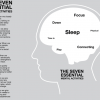I recently started taking PS in high doses 1g a day ( yeah expensive shit). It's helping tremendously, mental sharpness has increased, anxiety has and depression has also decreased considerably. I stack it with cod liver oil btw..
But I was doing some research on its safety today and found this article. I've seen other things on pubmed saying that serine feeds cancer cells. The second abstract is pure serine, but PS is just serine with phosphalipids attached.
I'm concerned about using PS longterm.
I don't quite understand the first abstract, I always struggle with the wording of these researchers.
https://www.ncbi.nlm...pubmed/26915293
Phosphatidylserine is a global immunosuppressive signal in efferocytosis, infectious disease, and cancer.
Birge RB1, Boeltz S2, Kumar S1, Carlson J3, Wanderley J4, Calianese D1, Barcinski M5, Brekken RA6,7, Huang X6,7, Hutchins JT3, Freimark B3, Empig C3, Mercer J8, Schroit AJ9, Schett G2, Herrmann M2.AbstractApoptosis is an evolutionarily conserved and tightly regulated cell death modality. It serves important roles in physiology by sculpting complex tissues during embryogenesis and by removing effete cells that have reached advanced age or whose genomes have been irreparably damaged. Apoptosis culminates in the rapid and decisive removal of cell corpses by efferocytosis, a term used to distinguish the engulfment of apoptotic cells from other phagocytic processes. Over the past decades, the molecular and cell biological events associated with efferocytosis have been rigorously studied, and many eat-me signals and receptors have been identified. The externalization of phosphatidylserine (PS) is arguably the most emblematic eat-me signal that is in turn bound by a large number of serum proteins and opsonins that facilitate efferocytosis. Under physiological conditions, externalized PS functions as a dominant and evolutionarily conserved immunosuppressive signal that promotes tolerance and prevents local and systemic immune activation. Pathologically, the innate immunosuppressive effect of externalized PS has been hijacked by numerous viruses, microorganisms, and parasites to facilitate infection, and in many cases, establish infection latency. PS is also profoundly dysregulated in the tumor microenvironment and antagonizes the development of tumor immunity. In this review, we discuss the biology of PS with respect to its role as a global immunosuppressive signal and how PS is exploited to drive diverse pathological processes such as infection and cancer. Finally, we outline the rationale that agents targeting PS could have significant value in cancer and infectious disease therapeutics.
Serine and one-carbon metabolism in cancer.
AbstractThe non-essential amino acid serine supports several metabolic processes that are crucial for the growth and survival of proliferating cells, including protein, amino acid and glutathione synthesis. As an important one-carbon donor to the folate cycle, serine contributes to nucleotide synthesis, methylation reactions and the generation of NADPH for antioxidant defence. Many cancer cells are highly dependent on serine, a trait that provides several novel therapeutic opportunities, either through the inhibition of de novo serine synthesis or by limiting the availability or uptake of exogenous serine.
PMID: 27634448 DOI: 10.1038/nrc.2016.81





















































